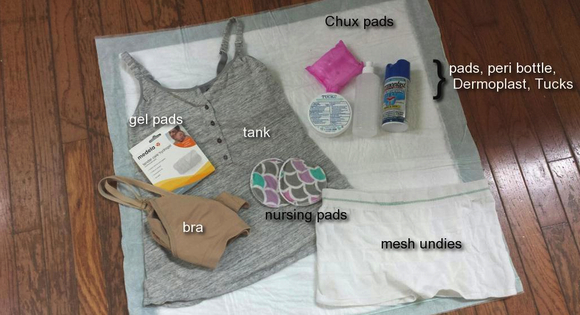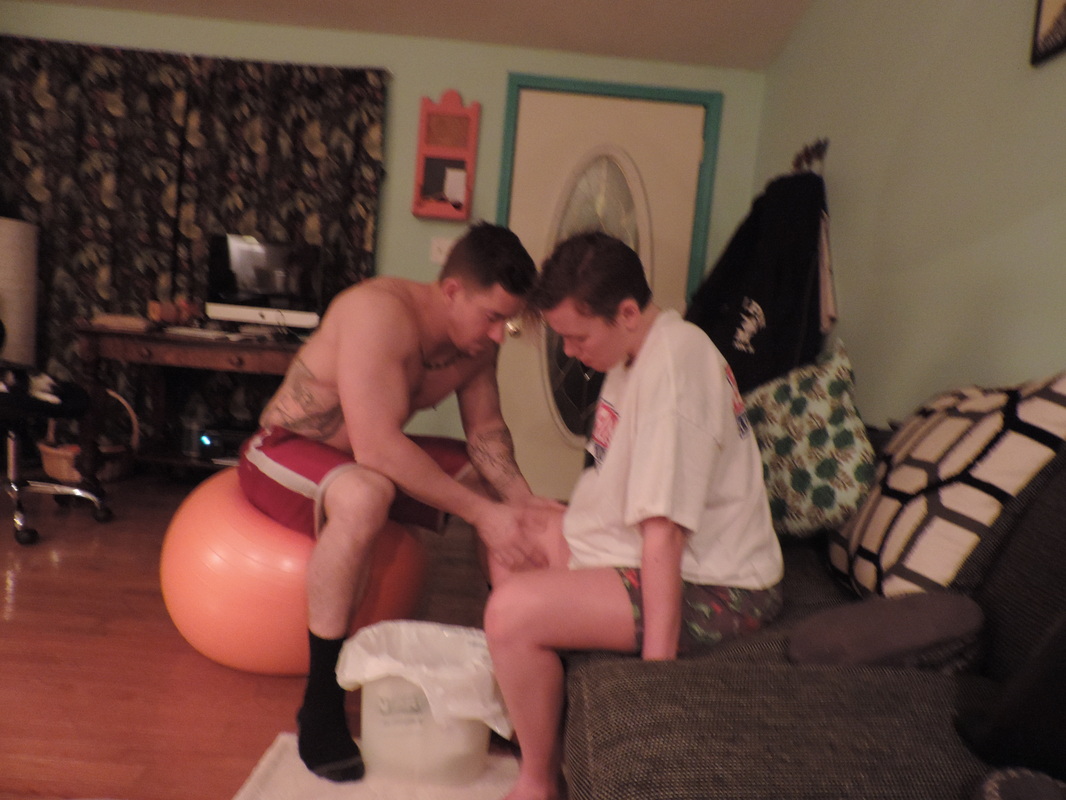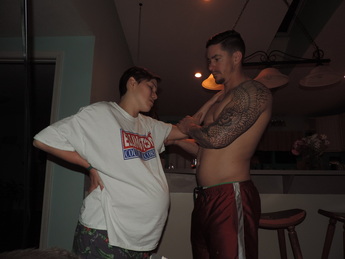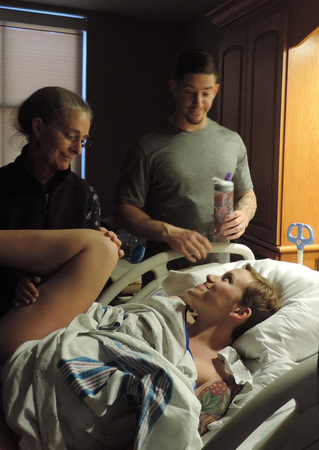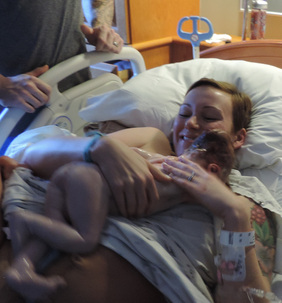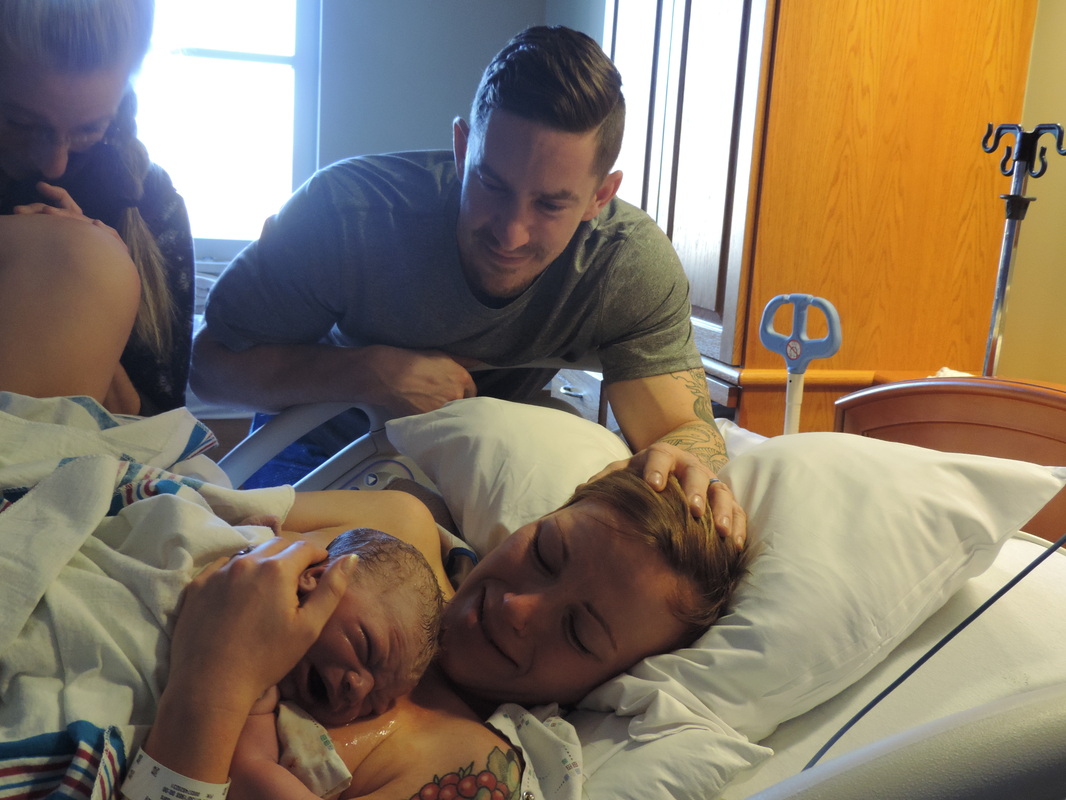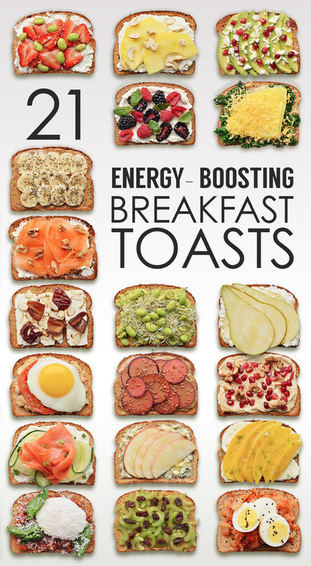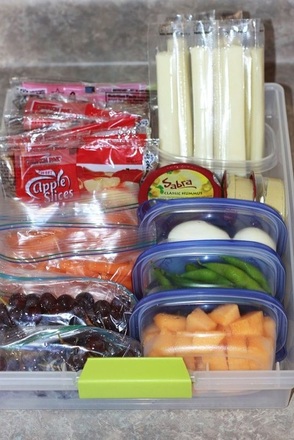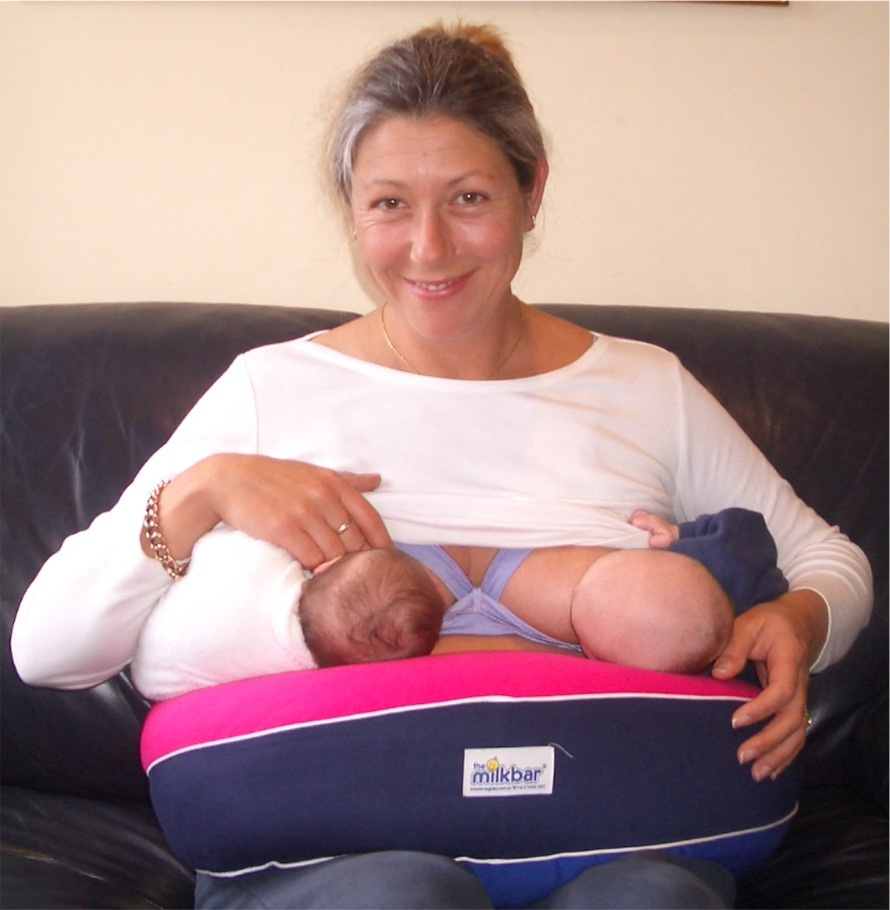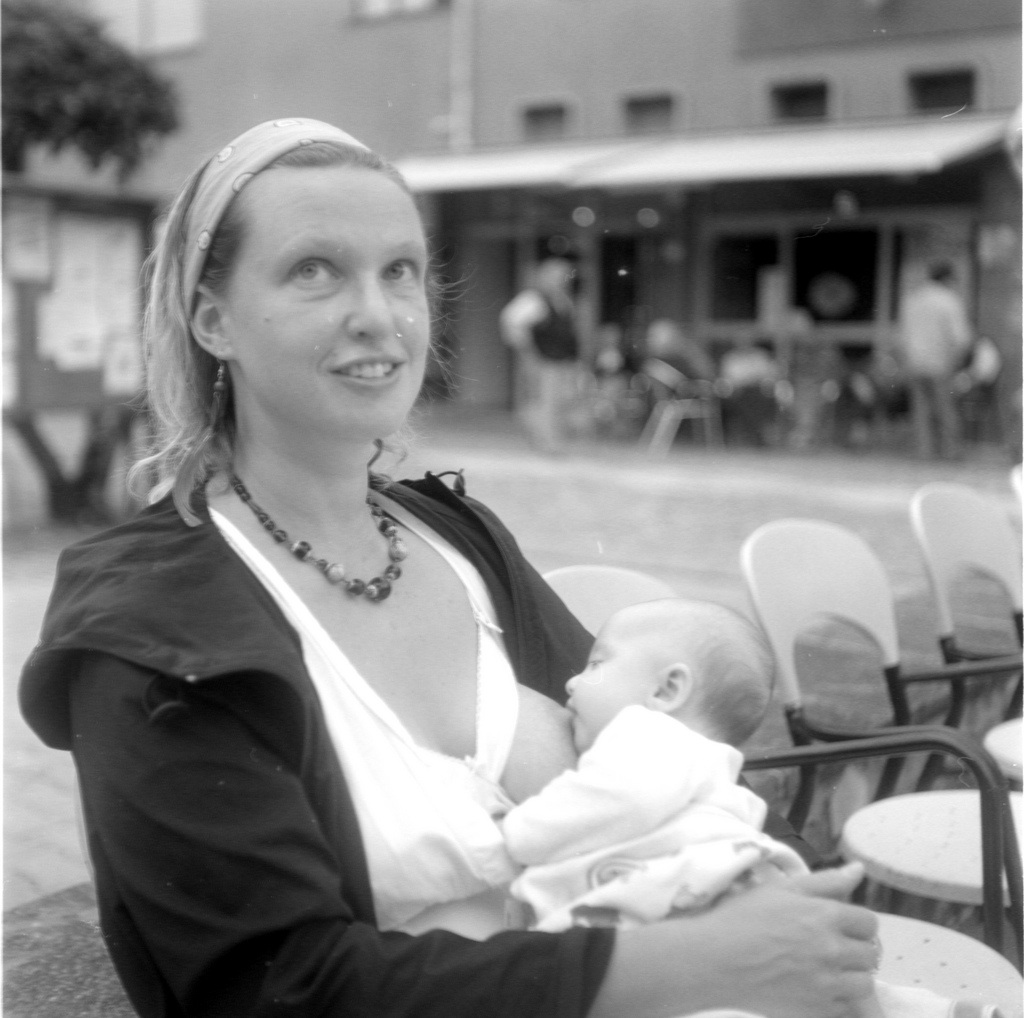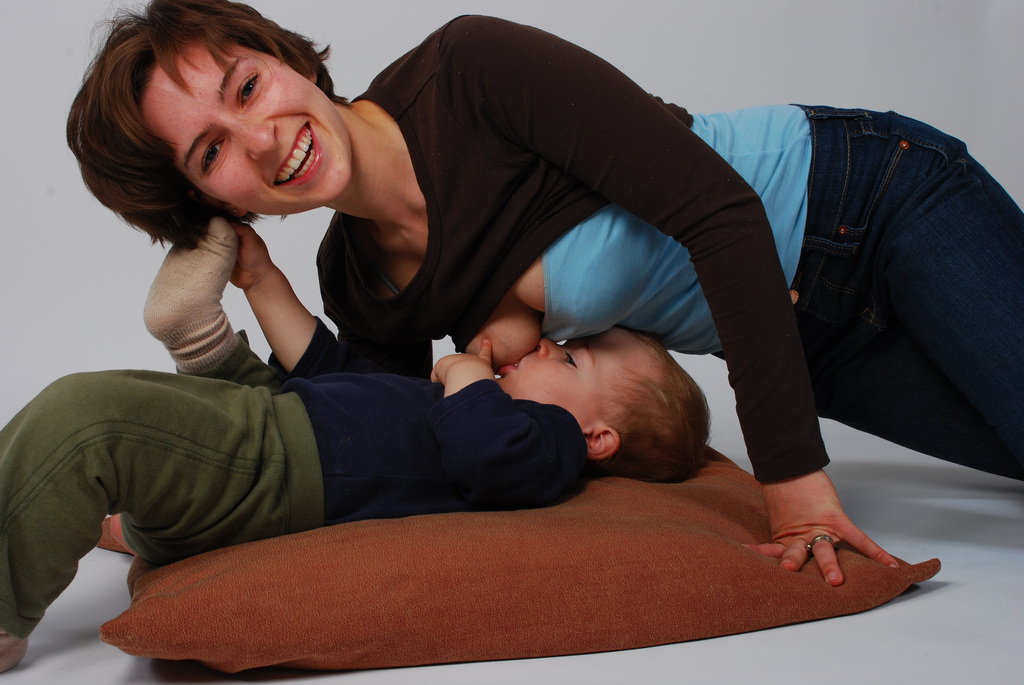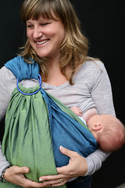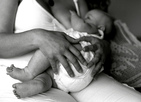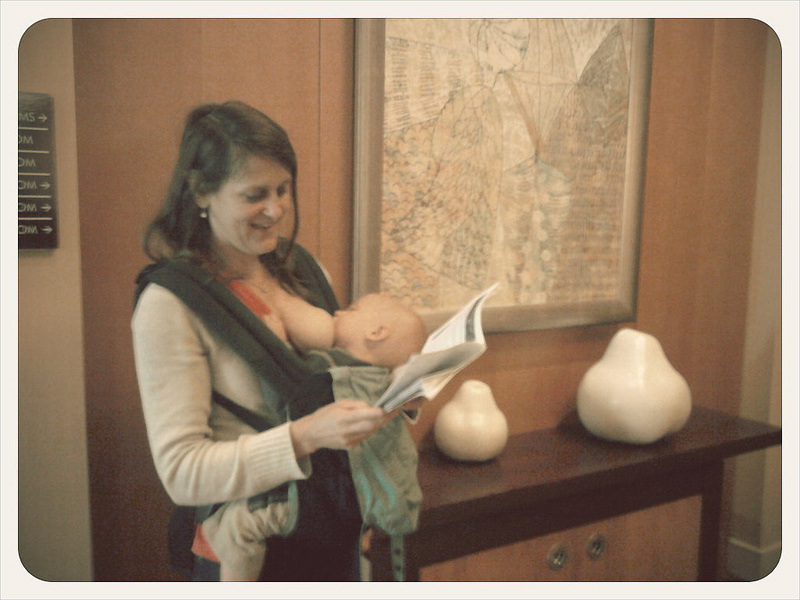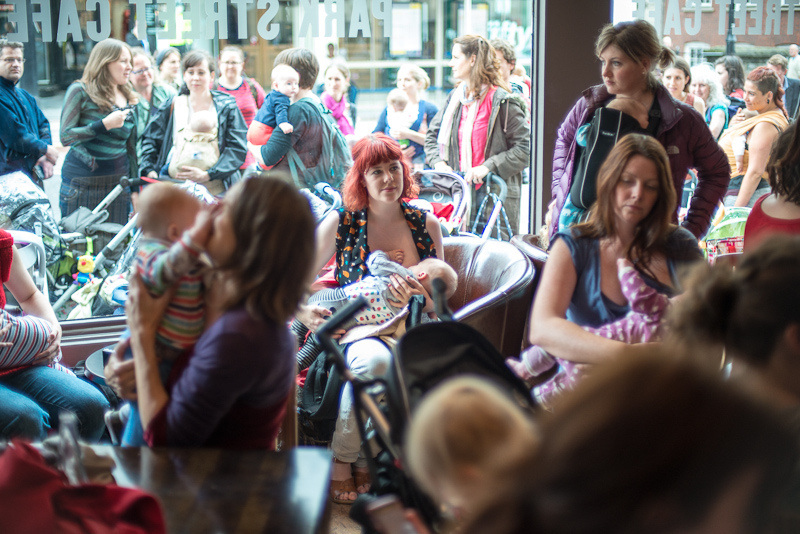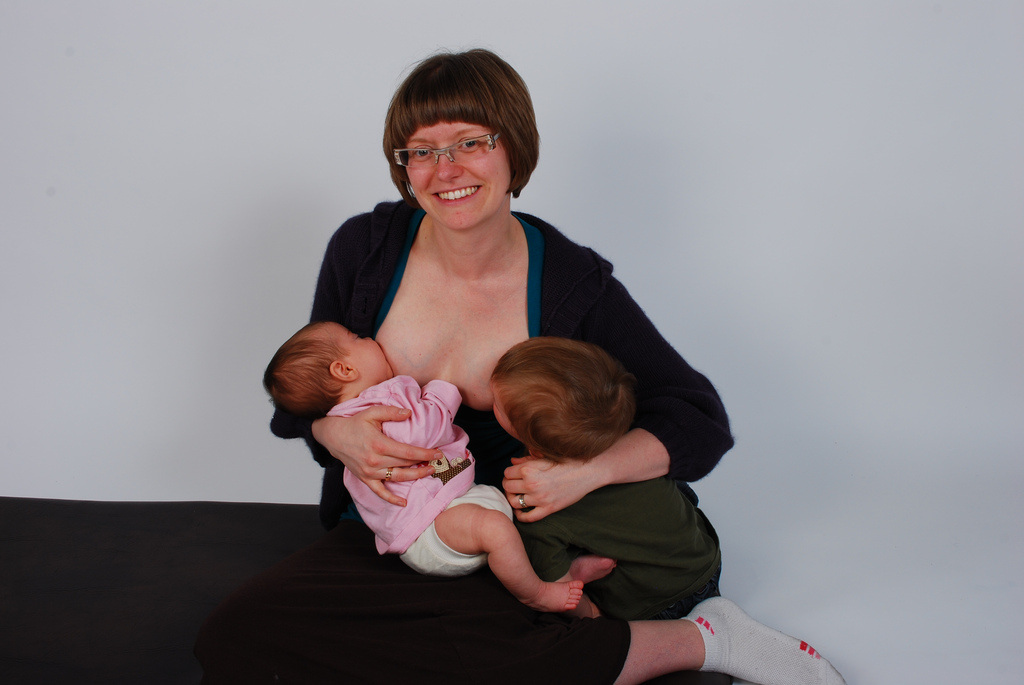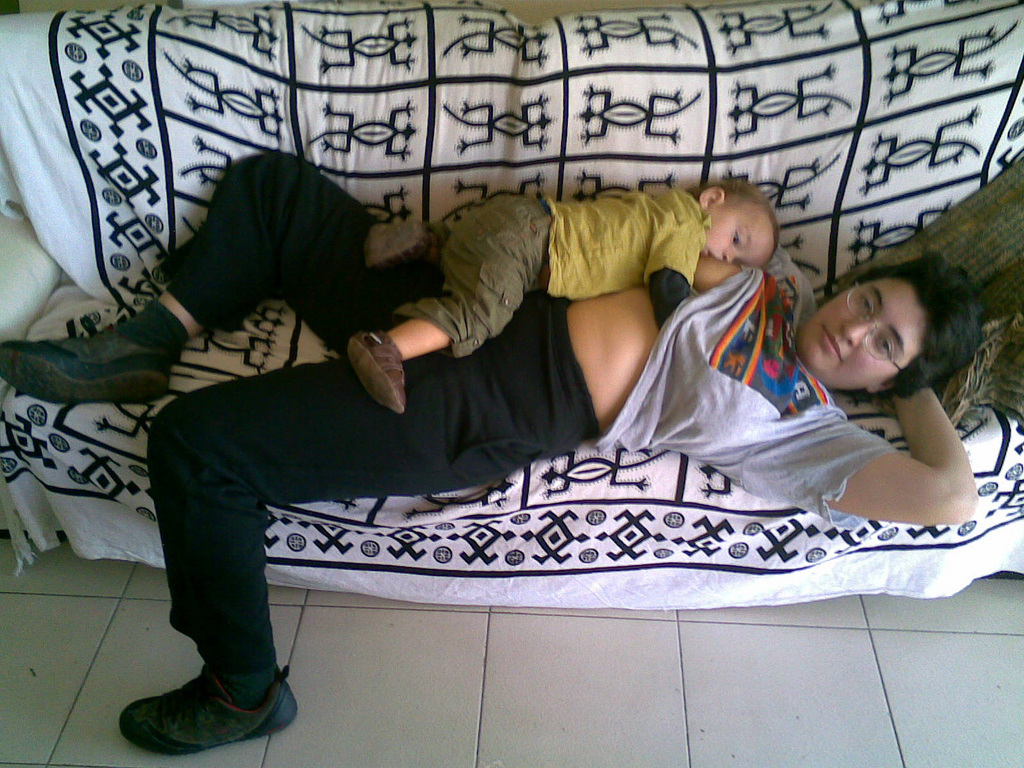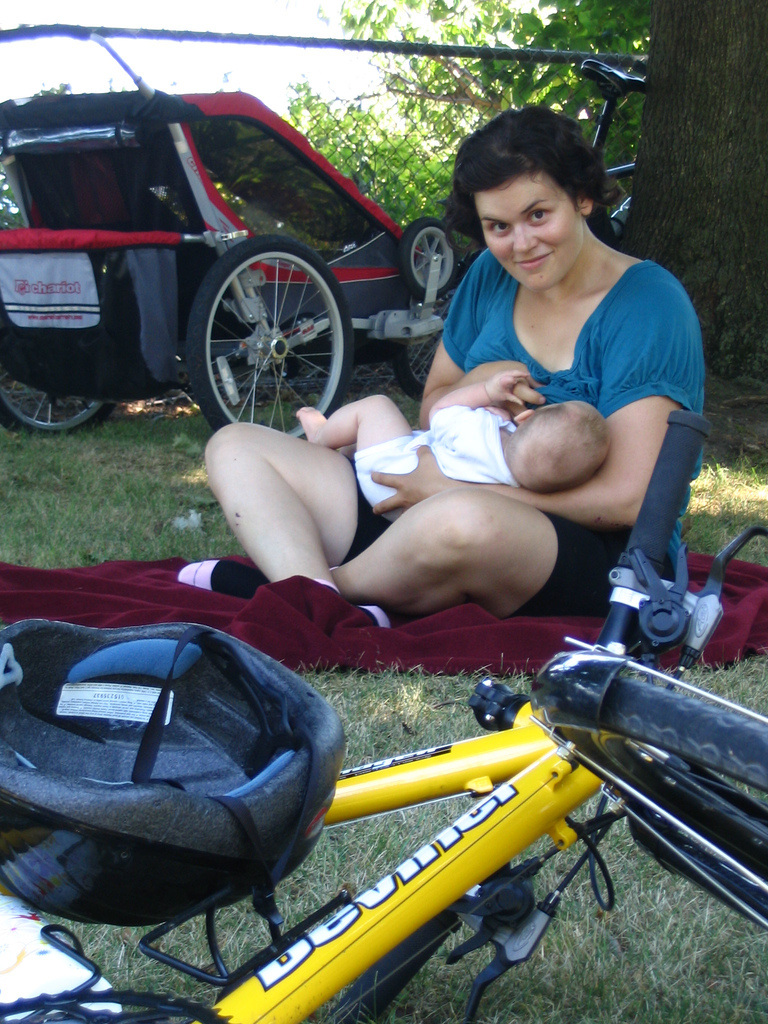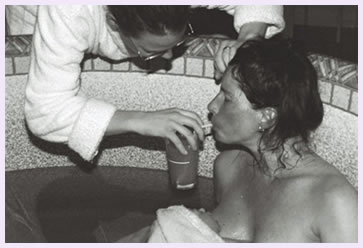 Comparing myself to others. It's a dangerous thing in many ways and usually leaves me feeling inadequate. No one is perfect, but when I feel like I'm failing it's difficult not to focus on the bad. Working through labor, birthing babies, parenting children...these are not feats for the weak-hearted. And when you're in that vulnerable state of figuring things out, it's very tempting to ask, "Well, how does she do it?! How are they making it work but we aren't?" Having previous experience or knowledge on the said topic helps but does not guarantee a straightforward experience. Despite your level of experience or how much you think you know, I think it really comes down to attitude and, let's be honest, the cards you're dealt. Sometimes we're dealt really crappy cards. Have you done this two or three times already? It may be very different this time around. It doesn't always come naturally and when I say "attitude," I don't mean you gotta be 100% positive. It doesn't mean you're not entitled to feel exhausted, confused, angry, or just plain over it. It means that you do the best with what you have where you're at. Take a proactive approach. Getting your ducks in a row before baby arrives can help you feel more prepared. I am a firm believer that planning ahead helps me meet my goals. Reaching out for support and gathering resources is HUGE. Hiring a doula, taking classes, choosing a care provider that you feel comfortable with...these are all things that can potentially help you have the best experience. You can customize your preferences as you see fit, which will help you feel more at ease. Sometimes though, no matter how much researching and planning we do, we hit a few speed bumps or stray from our original plan. When this happens, it can be devastating. It may feel so overwhelming that you may not know what your next step will be. Hopefully, you have your people to lean on and your trustworthy resources close by. I also think it helps to: Validate. Remind yourself that this is hard work. Take your time. You are not alone in this. Remind yourself that you're doing your best. Or, maybe it's not your "best," but under the circumstances, you're doing a pretty darn good job. Breathe. Things will fall into place. Reframe. I am my toughest critic. What feels like failure to me may feel like success to others. Basic example: I was consumed by my grades in school. I always aimed for all As. I was a perfectionist, and it was a high expectation that I set for myself. If I landed a B, I was very upset. Others may have been very pleased with a B. Often, I needed to step back and look at the whole picture. "Okay, you got one B but four As," or "You weren't the only one who had trouble with that final." Pros vs. Cons lists really help me sort out my feelings, too. I can reason with myself and realize, hey...this stinks but it's not the end for me. It ain't all bad. Troubleshoot. Tell yourself what's done is done but ask, "How can I make this better?" Find your support people and talk with them. Process your experience and take time to acknowledge the feelings that you have- don't brush them under the rug. Find folks who have had similar experiences- you may learn from them and find comfort that they understand where you're coming from. Or you may want to sit down with a professional who can be objective, nonjudgmental, and who can help you navigate what's to come. Comparing ourselves to others cannot benefit us because it belittles our personal experiences. We're all doing what is best for ourselves, our babies, our families. You are different than your mother, your neighbor, even your best friend. Find what works for you and embrace it.
0 Comments
These are just a few things that I couldn't live without in those first weeks of the postpartum period:
What items were essential in your early days as a new mama?
The days before our baby B arrived, I woke up every morning thinking to myself, "Maybe today is the day!" and I would climb into bed every night thinking, "Well, maybe tomorrow." I knew my baby would come when he/she was ready (we didn't know the babe's gender) so I tried to distract myself as much as possible while waiting. I cleaned the house, organized the nursery, went to the gym, watched every episode of New Girl on Netflix, soaked in the bath while reading Ina May, bounced on my birth ball, drank lots of red raspberry leaf tea, baked the baby a birthday cake (lemon bundt cake to be specific--thank you, Pinterest!). I tried remaining positive, knowing this was a special time between my husband, J, and I. It would only be just the two of us for a little while longer, and soon we would be a family of three. It was a surreal concept that I couldn't quite wrap my head around, and despite it being unknown territory I was very excited. We planned to birth our babe at home with the help of a certified professional midwife. We also hired an amazing doula, who is also a close friend, to assist us at the birth. We rented a birth pool and did a couple of test runs to make sure we knew how to use it. I made birth affirmations and placed them on the wall behind the pool, knowing that these positive mantras would help carry me through labor. I made a playlist and day dreamed of bringing my baby earth side while the sweet and slow music played in the background. Our home birth supplies were neatly stacked in the co-sleeper that sat in our bedroom. I thought, "Any day now, baby. We're ready for you!" Day 1- On the morning of January 16 around 1am, I woke up to mild contractions. At the time, I wasn't calling them contractions as I didn't really know what 'contractions' felt like. Basically, I was really crampy. I would get up about every hour until 8am or so to pee and work through the crampiness. The cramps were mild enough that I was able to doze off once I climbed into bed. I continued on throughout the day with all of the activities that kept me busy throughout the week before (exercising, baking, Netflix binging, etc.) My contractions were spaced out but present throughout the day and into the evening. I had lost part of my mucus plug the day before so I knew something was happening. 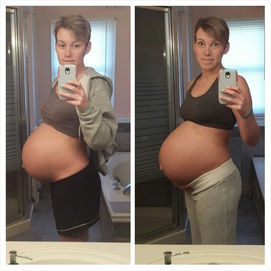 Belly getting lower and lower... Belly getting lower and lower... Day 2- Did the same damn things I did on Friday. Woke up frequently throughout the night due to crampiness and having to pee often. Cleaned the house and ran some errands. In the afternoon, J and I went to Gandolfo's for lunch. The seats were incredibly uncomfortable and hard. I was having consistent contractions and I'm sure people were starting to stare (No one else was deep breathing during their lunch!) J said I pulled it off like a champ, but I didn't believe him. We went downtown and walked up and down Kirkwood and stopped by Hartzell's for ice cream. Still very crampy, I thought to myself, "YES! It's happening. This baby is coming." By the way, there are a lot of cool celebrities born on January 17 so, naturally, I had an inkling today would be the day. Day 3- I'm still pregnant. I, again, woke up right around 1am on Sunday morning with those annoying contractions. I knew these contractions were helping my body prepare for baby but I was so over it. Up every hour but this time, it only felt good to sit on the toilet. I didn't want to move! I tried to stay in bed until 8am or so but I don't think I got much sleep. Is this cramping helping my cervix move forward? Helping it to thin and shorten? Am I dilating? My childbirth educator/doula brain would take over and I couldn't turn it off. I reminded myself that even if I couldn't sleep, it was important to rest as much as possible. I was hoping I was in early labor but didn't want to get my hopes up. J came home from training clients at the gym and brought me Cresent donuts for breakfast (yep, my husband/ personal trainer brought me donuts. That's love.) I continued to cramp throughout the morning, and later on, we decided to go back to Gandolfo's for lunch (the food there is good but you know, we had coupons to use up). Those seats!! They were so hard and uncomfortable. I had only taken a few bites out of my sandwich before realizing I no longer wanted to be at Gandolfo's. J offered to wrap up my sandwich while I went to the bathroom. I was having contractions every 2-3 minutes and they were lasting around 40 seconds each. I was also losing more of my mucus plug. Of course, I was all like, "Is this early labor? Active labor?!" I continuously had to remind myself to get out of my head and focus on the now. We drove over to the east side of town and walked around the mall for an hour or so. My contractions were still very close together, so we left the mall and went to Kroger to get some last-minute groceries. I felt so uncomfortable that I didn't want to go in and decided to sit in the car. Soon after my husband got out of the car I realized I could not sit still. I got out and leaned on the car, swayed my hips, and was squatting in the parking lot. Keep in mind this is the new, swanky Kroger that's always hoppin'. The waiting felt like forever and I was extremely eager to get home. I started to vocalize through my contractions and texted our doula once we pulled in the driveway. She recommended we both sleep as we would probably be up most of the night. Shortly after climbing into bed for a nap, my husband was out. Me, on the other hand...I couldn't get comfortable one bit. I was having a hard time coping but didn't want to wake him up so I ventured off to the opposite end of the house. I desperately wanted to get in our bath tub but knew that water would not help speed up labor until I was in the thick of it. Being immersed in warm water in early labor can slow down or stop your contractions. I decided it was more important that I try to catch up on rest than focus on making contractions more progressive. Our doula arranged to be over by 7pm. I was very emotional and cried to J when he woke up. He calmed me down, reminded me that I was doing a great job, and that our doula would be there soon. When our doula arrived, I was in our dimly lit bedroom moaning and swaying. She encouraged me to do some lunges and offered me sips of water. I moved to the toilet where she propped me up with pillows and rubbed my back. It was starting to hurt but in an unusual way-- like it was pulling from underneath my ribs. I soon realized I had pulled a muscle and thought it may have happened while in the tub. Soon after, I began throwing up. I thought, "Yes. Bring it on! I'm sure this puking is helping me open up." Our doula contacted the midwife and updated her on what was happening--she said she would be over soon.
It was around 1 or 2am when my midwife suggested I whip out my hand pump. My contractions were still very strong but had spaced out immensely. I remember feeling so drowsy in between surges-- I would wake up at the peak of them and barely be pumping, the pump itself almost falling out of my hands. Dude, I am so tired. I hadn't had a great night's sleep since Thursday and looking back, I think I am sleeping better with my newborn than I did the weekend I went into labor..I was *that* tired. My midwife told me that I was doing a great job and that I should go get in my birth pool. Oh, I was so happy to hear that. My doula went into the back bedroom to catch up on sleep and my midwife stayed in the living room while J and I ventured into the bedroom where the birth pool sat. He sprawled out on the bed as I sat at the edge of the pool, my top half draped over the side. Soon, the whole house was sleeping. With every contraction, I whispered things like, "C'mon, baby" and "Ooooopen." This really helped, as cheesy as it sounds. Still, my contractions were very spaced out. The water really took the edge off of my back pain and the pressure I was feeling down low. I stood up a couple of times in the pool just to make sure the intensity of the contractions was still there. Oh boy, was it ever. I think I had been in the pool for an hour or so before I climbed out, wrapped a towel around me, and walked back into the living room. My midwife, as sweet as ever, asked, "What's up, darlin?" I told her I wanted to be checked and I wanted to know the number. I *needed* to know if I had made any progress. She told me I was at 5 cm. (hooray!)...but I was 5 cm. when she first checked me (noooo!). I felt so discouraged. I didn't feel as if I was suffering, but I honestly didn't know how much longer I could keep at it. I was so tired and more often than not, my back hurt worse than the contractions. I was having a hard time coping and hated the thought of being checked again, hours later, to find my cervix hadn't changed. I couldn't understand why my contractions were so far apart--I couldn't relax enough to fully sleep and yet everything we had tried to bring contractions closer together was not cutting it. And then, like word vomit, I remember blurting out, "I want an epidural. I think I want to go to the hospital." I never thought I would say that. I dreamed of birthing our baby at home. She agreed that my body may benefit from some pitocin and that she would support me, whatever choice I made. It was reassuring to hear that, just like I was thinking to myself, this is not characteristic of a straightforward labor. My baby had been LOA for the past couple of months but maybe something else was going on. I woke up my husband and told him that I wanted to go to the hospital. I apologized over and over again. He consoled me and helped my doula and me pack a bag. My midwife called into my back-up physician to let him know we were coming in. The ride to the hospital was the absolute pits. We parked in the emergency parking garage and I waddled up to the labor and delivery floor. The nurses asked the annoying, but necessary, questions upon admittance as I sat on a birth ball and leaned over the side of the hospital bed. My back still aching, I asked J to use some counter pressure and hold a warm rice sock against my lower back. Lab came in to draw my blood and I was hooked up to IV fluids. I was informed that the anesthesiologist was at home (I knew that was coming!) and I waited around two hours for him to get there and administer the epidural. Once it was in place, we all rested for a few hours. The epidural brought so much relief-- even the pain from my pulled muscle was gone. It was incredible! My doula went home and we told her we'd call when things started to progress. I found out that one of my friends would be working day shift and requested for her to be my nurse at shift change.
The nurse and nurse midwife started to set up the room for birth, and I got into a side-lying position. My midwife supported one of my legs while my husband stood by my head, offering sips of water between pushes. My doula quietly snapped pictures of the whole experience. As he crowned, I reached down and touched the top of his head. He's really coming out! Finally! The nurse midwife asked if I wanted to bring him up onto my chest and I happily said, "Yes!" In less than an hour, he was here. I reached down to bring him up to my chest as "Heavenly Day" by Patty Griffin was playing...it was a moment I will never forget. B was born with a nuchal hand (left hand up by his face), which is what probably caused my terrible back pain. 8 pounds, 11 ounces and 21 inches long...born at 1:34pm on MLK, Jr. Day. I'm not quite sure how he ever fit inside me--the things a woman's body is capable of are truly amazing. Despite our transport to the hospital, I had a wonderful birth experience. I felt fully supported the entire time and had the dream team by my side during delivery. I was able to advocate for myself. I was listened to and treated with respect. I am thankful for the tools the hospital offers that are not available in the home setting-- they can work wonders when you need them. Maybe next time we'll birth our baby at home, but right now, I am content focusing on our new, amazing son. I'm grateful that both my baby and I are healthy, that there were no major complications, and that I've had a smooth postpartum recovery. Birth is an unpredictable life event that you will remember forever, but it's only the beginning of something much, much bigger. My heart is whole as I sit here typing our story and nursing my little guy. I can't wait to see what the future has in store for us.  Hi, we just had a baby. Hi, we just had a baby. Grocery shopping. Woof. When our fridge starts looking bare, I cringe at the thought of going to the grocery store. It's always so busy, my shopping list is lengthy, and you can bet I will forget something on that list. I should have the list memorized by now and yet I always manage to space going down a certain aisle. Now that I'm no longer working 40 hours a week in an office, I do feel as if I have more time to compile a list of what we need, meal plan, and get organized. When I shop, it's only for my husband and me (okay, so there's three of us if you count the human I'm growing)...but it still feels like we need a good amount to get through the week. My husband eats so damn much. I don't feel bad about sharing this with you because he knows it's true, too. Earlier on in our relationship, he looked at me during dinner one night and said, "Babe, you know how much you need to eat to feel full? Well, I'm bigger than you and I need like..three times that amount." Fair enough. I married the man and promised to support him always, even when he cleans out the pantry. I often think about how our lives will change in these coming months. As much as I daydream about our labor and birth experience, I think about the postpartum period even more. When I talk to expectant folks as a doula and childbirth educator, there is a lot of focus on birth. I get it-- it's the unknown that is captivating, exciting, and maybe even a bit anxiety-inducing. But what about parenting? Labor and birth is a short amount of time compared to the rest of our lives. Raising a child is big stuff and incorporating a new person into your life *forever* seems a bit more overwhelming to me. When you have a baby, even the simplest tasks get put off because...well, it's just hard to squeeze it all in. It's challenging to take care of ourselves and take care of another human 24/7. As a new mama, even feeding yourself can be a challenge! And when you're running low on sleep, haven't showered in a day (or 2 or 3? Not judging.. this will be me soon. We're in this boat together, sister), and have only eaten a bowl of cereal and a banana in the last 24 hours...you're going to feel pretty shitty. Plain and simple. So...when this new person is born, promise me this one thing: that you will eat! Even better: promise me that NOW, when you're still pregnant, you will start planning for the postpartum period, not just for labor and birth. As new parents, it's hard to focus on your needs, but ya gotta give yourself some TLC so that you can be there for your babe. The laundry, the baby shower thank you cards...those things can wait. Nourishing your body is more important! Keep in mind that two of the most amazing things you can stick on your baby shower registry are a meal train and a postpartum doula. Your doula can help with cooking, remind you to eat a little something, and even run errands for you (like that shopping trip you've been dreading!). There are great websites out there that can help you start up a meal train (to name a few: Take Them a Meal, MealBaby, Meal Train). Send the link to your meal train via email to family and friends prenatally. Folks can sign up to bring over a meal as often as you'd like (every other day, three times a week, etc.). You can include food allergies and limitations, your time frame for dinner, and even how you'd prefer the food be delivered ("If the front door is shut, please leave the food in the color on our porch."). Aside from meal trains and postpartum doulas, you can also prep your meals ahead of time. Freezer and crockpot meals are a smart option for the postpartum period, and Pinterest makes it easy to collect yummy recipes without aimlessly surfing the web. Below I've listed some of the best recipes I've found on this genius website. I say "the best" because they are healthy, relatively easy, and for some of 'em, you can even eat with one hand. :)
Do you have any quick, simple meals/snacks you love and would like to share? Please post in the 'Comments' section below!
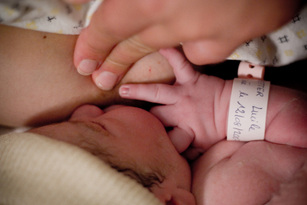 Being a part of the BABS* Family Support Advocates (FSA) program is a great way to give back to the community. FSAs are scheduled for 24-hour on-call shifts, during which they may be called to support a new family any time during their hospital stay. One-on-one support immediately following birth is beneficial not only to mom and baby but the whole family. Breastfeeding success greatly depends on those first 24 hours immediately following birth--but it's hard for moms and partner to focus on this new (and sometimes daunting) task after birth, especially if it was long or complicated experience. Molly Mendota, BABS Doula Supervisor, states in the recent BloomingFamilies announcement letter, "We’ve found that a newborn will often nurse well within an hour or two of birth, and then things go downhill. By the time the birth doula checks in a day or two later, the baby hasn’t latched, or mom’s nipples are hurting, and the stress level is high. Combine this with recovery from a surgical birth, or lack of family support, or any number of other factors, and it’s a recipe for a breastfeeding disaster." The nurses at the hospital are fantastic, but because they often have so many women and babies to check on, it makes it difficult to provide continuous support for every family. FSAs provide the follow-up care needed after the birth of a baby. They provide emotional support and reassurance to mom and family. FSAs also do something simple, yet so important: help make sure babe gets fed and mom's milk supply is protected. There will be an FSA training scheduled for mid-November (dates to be determined) at BABS. FSAs commit to monthly meetings and a minimum of two 24-hour on-call shifts per month (8am-8am). To be an FSA, you do NOT need to be trained as a doula, but you do need to apply and be accepted before volunteering. If you have any questions, please contact the Doula Supervisor, Molly Mendota, by email at [email protected], or leave her a message at BABS, 812-337-8121. *Bloomington Area Birth Services (BABS) is a non-profit organization dedicated to helping moms, babies, and families. There you can find childbirth education classes, breastfeeding assistance (at The BABS Lactation Center), exercise and activity classes, various prenatal and postpartum workshops, support groups, and parent-baby playtime. BABS also supplies new & expectant parents with resources and maternity items throughout their extensive lending library and boutique. BABS is located at 2458 S Walnut St. in Bloomington, IN. World Breastfeeding Week is the first week of August! Ready for some random breastfeeding facts? Did you know...
Below is a little photo album I've thrown together of normal, everyday women breastfeeding. Some women are nursing infants, others are nursing older children. A few are even tandem nursing-- breastfeeding twins or two siblings at once. Breastfeeding is normal, and we need to embrace it in order for moms to have the confidence and proper support to nurse their babies! Special thanks to Weebly and the pictured families for sharing these photos. (Click on thumbnails to view enlarged photos)  Source: www.freerangefeeding.tumblr.com Source: www.freerangefeeding.tumblr.com If you have any fun breastfeeding facts, feel free to share them in the 'Comments' section of this blog post. And, of course, if you would like to share a breastfeeding photo of your own, you can email it to me at [email protected]. Breastfeeding is normal and beautiful. Spread the love, y'all. First, I just want you to take a moment to re-read the title above and realize how awesome it is, period. MODG, a comical blogger, shared with readers the advantages of breastfeeding in honor of World Breastfeeding Week this past August. Of the top 10 advantages, one was “You always win.” She then went on to share an example of this advantage with a fictitious dialogue between her and her husband:  Photo Credit: Weebly Photos B: What a hard day at work. Let’s watch the game. Me: It was such a hard day keeping our son alive with my own body. Let’s watch 3 hours of The Bachelorette. B: (hands over remote) Laughs aside, this is AMAZING! I think it’s unfortunate that the human body is often underestimated of its capabilities; however, our bodies as females are designed to birth, provide for, and nourish our babies. Side note to expectant parents: let remnants of this simplicity carry over into your first few months of parenting. Your head is probably spinning with conflicting information from the media, family and friends (who usually mean well when dishing out advice), and health care professionals in regards to parenting. Please know that you don’t need lots of fancy things to make your baby happy. Newborns love to be held close and to hear your voice. Keep your baby near, preferably skin-to-skin, and you can never go wrong.
 Photo credit: Busy Mommy Media Breastfeeding can help protect your child against:
Breastfeeding can provide pain relief to babies (keep your little one at your breast while newborn procedures are being done after the birth) (Yamada, 2008). Breastfeeding also improves a child's cognitive and language development as compared to children who were not exclusively breastfed (Kramer, 2008). As you can see, your baby benefits from breastfeeding in many ways. Not only because of it's protective factors against illness and infection, but because breastfeeding promotes bonding between mother and baby, too! Breastfeeding is not just a way to feed your newborn; it deepens your attachment to him/her as well. When you breastfeed your baby, your body releases oxytocin and prolactin, hormones that help “let down” your milk and deliver it into your baby's mouth. These hormones are also responsible for the blissed-out buzz you get when you breastfeed, causing relaxation and a desire to cuddle with your baby. The release of oxytocin also helps your uterus to contract and shrink back down to its pre-pregnant size. As luck would have it, your uterus isn't the only thing that reduces in size when you breastfeed. Most women typically lose inches in their waistline when nursing their babies (LLLI, 2010). That's right...breastfeeding can help you fit into those clothes you wore back before you were known as “Mommy.” If you breastfeed your baby exclusively (not providing any other food or drink except breastmilk) and often (remember to watch your baby and not the clock!), your period is not likely to come back for at least six months. This contraception method, known as the Lactational Amenorrhea Method (LAM), is 98-99% effective when used correctly. When you nurse based on your baby's feeding cues and “empty” your breasts when they feel full, you are following the process of supply and demand. Basically, your baby is removing the milk from your breasts in order to allow more room for new milk production (known as “galactopoiesis”...how about that for your 'Word of the Day?'). So, let's recap: Mom is bonding with baby, losing weight, and not experiencing a monthly period? Pretty impressive, but the benefits don't stop there. Moms who breastfeed are also at a lower risk of developing breast, uterine, and cervical cancer. They are also at a reduced risk of developing diabetes and osteoporosis (LLLI, 2010). New studies even show that moms who breastfeed actually get more sleep than moms who do not. Last, but definitely not least, we should stop and take a second to think about how breastfeeding can influence society as a whole. I've often heard many times before, "Breast is best," but I disagree. I know, I know. You're thinking, "Ummm..Lindsey? You just listed one million reasons why breastfeeding is fabulous. Of course you think breast is best." Actually, breastfeeding is the norm, not "the best." Like I stated earlier, women's bodies are designed to feed their babies. And it's not just about baby's nutrition, but the strong relationship that develops between mom and baby, which eventually spills over into the relationships that exist in our communities. Unfortunately, our society has lost sight of the practicality of women's breasts, focusing more on their sexuality instead. This can make it hard for women to breastfeed in public or even discuss using a breast pump at work with their employer (Pumping moms are allowed time and space in their workplace according to the law, by the way). If you happen to catch a mom breastfeeding in public, cheer her on. Tell her that she's doing a great job. I believe that we need to embrace breastfeeding in order for moms to have the confidence and proper support to nurse their babies. After all, they're filled with too much goodness to not utilize, right? And for one last laugh.... Sources:
Pregnancy, childbirth, and becoming a new parent present times of challenge and development, whether it be for the individual or the family. Annemarie van Oploo once shared, “Childbirth is a time when a woman’s power and strength emerge full force, but it is also a vulnerable time, and a time of many changes presenting opportunities for personal growth” (Schwegel, 2005). A new addition to the family requires extra physical, educational, and emotional support. A postpartum doula provides this care by offering a helping hand, a listening ear, and a plethora of resources. Her presence is invaluable and truly makes a difference in the lives of many new families. There are multiple benefits to hiring a postpartum doula for the first few months after baby’s birth, a time also known as “the fourth trimester.” Research indicates that those who hire a postpartum doula make an easier transition at home after baby is born, which ultimately affects family members’ physical and emotional health. These individuals also experience greater parental satisfaction and fewer mood disorders (DONA, 2002). More specifically, families who acquire the help of a postpartum doula experience greater success with breastfeeding, greater self-confidence, and a smaller incidence of postpartum depression (DONA, 2002). The postpartum doula not only “mothers the mother,” but she also tunes into all family members’ needs. In fact, when the postpartum doula “mothers the father,” he is better able to take care of his partner so that she can adequately provide for and nurture their baby. For example, a large factor in breastfeeding success is a supportive partner (Giugliani, 1994). Simple acts such as partner providing snacks, extra pillows, and words of encouragement aid mothers in achieving successful breastfeeding relationships with their babies. It is crucial that women and their families receive postpartum support, especially in North America. Our culture highly values independence, which in turn may lead many individuals to think they must handle their personal issues alone. Unfortunately, this matter carries over into the postpartum period and influences our society’s ideals of the “perfect parent.” The postpartum doula fills this void and prevents isolation from occurring. She becomes a crucial asset in certain situations: The family having no friends or family nearby to help, the mother experiencing a difficult birth, the mother giving birth to a premature baby or multiples, etc. The doula helps to foster a support system that families can utilize in the present and future. According to DONA’s Standards of Practice, the postpartum doula provides support after the baby’s birth as well as up to three months in the family’s home. Certified postpartum doulas affiliated with DONA have completed a 27-hour workshop training, read an extensive list of books pertaining to the postpartum period, and created an informative list of local and national resources. They understand newborn characteristics and basic care, help with breast and/or bottle feeding, assist with light household organization and meal preparation, and provide sibling support if applicable. Their services have been evaluated by at least three families as well as a healthcare professional. Although she does not provide medical assistance, a postpartum doula can make referrals for other professionals if needed. A doula is a generalist, but she has the power to connect families with other experts in the community, helping families to feel cared for and educated. According to DONA’s Code of Ethics, every woman who desires to have a doula should be able to have one. Doulas should set reasonable fees when working with clients. If a doula is not available for a mother who requests postpartum assistance, it is that doula’s responsibility to refer the mother to other doulas who are available (either through local resources or DONA). Follow-up with new moms is crucial in order to ensure they get the help that they need and deserve. When a doula decides to work with a client, she must demonstrate dependability. This involves creating and sharing a contract that discusses services provided, back-up support, refunds, fees, etc. Doulas should always maintain confidentiality when working with their clients. This simple action illustrates respect of privacy and will allow a mother to feel more secure in the care of her doula. 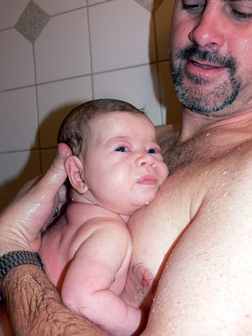 Dad and baby, skin-to-skin. Bringing a new baby into the home not only presents physical challenges, but emotional and mental ones as well. Yes, all moms will have to recover from childbirth and experience sleepless nights, but they, along with other members of the family, will have to adjust their roles, too. Women are now mothers, men are fathers, and the only child is now a big brother or sister. Luckily, this transition will not be as unsteady with a postpartum doula’s guidance. Doulas steer new parents in their new roles as caretakers. When the doula models, demonstrates, and explains certain behaviors and techniques, parents (and siblings) receive concrete instructions and develop coping skills for working with the new baby (Kelleher, 2002). In this way, family members learn how to bond with and integrate baby into their family unit. By providing a nonjudgmental outlook, reassurance, and evidence-based information, the doula fosters independence and confidence in new parents. She helps them to feel empowered and adequate for this challenging yet rewarding new responsibility. Every family will benefit from a postpartum doula’s practical, yet special touch. A doula truly makes the difference! *All content written and compiled by Lindsey Rupp. Please contact me before using anything found here.* Sources:"DONA International – Code of Ethics for Birth Doulas." DONA International. 2005. Web. 20 Oct. 2011.<http://www.dona.org/aboutus/code_of_ethics_birth.php>.
"DONA International – Standards of Practice for Birth Doulas." DONA International. 2005. Web. 20 Oct. 2011. <http://www.dona.org/aboutus/standards_birth.php>. Giugliani, E., Vogelhut, J., Witter, F., & Perman, J. (1994). Effect of breastfeeding support from different sources on mothers' decisions to breastfeed. Journal of Human Lactation, 10(3), 151-161. Kelleher, Jacqueline. Nurturing the Family: The Guide For Postpartum Doulas. Xlibris, 2002. Print. Kelleher, Jacqueline and Penny Simkin. The Postpartum Doula’s Role in Maternity Care: A DONA International Position Paper. 1998. A publication on the value of birth doula support. Schwegel, Janet. Adventures in Natural Childbirth: Tales from Women on the Joys, Fears, Pleasures, and Pains of Giving Birth Naturally. New York: Marlowe &, 2005. Print. The ways in which society views and manages childbirth have evolved over time. Decades ago, women were not able to actively be a part of the labor and childbirth experience. Routine procedures involving chloroform, forceps, and solitude during labor and birth left women feeling “dehumanized” and alone. Many of these women knew of no other way to birth and had very little say in what happened in the delivery room (Harper). Today, however, we have come to understand that birth is a natural, physiological process. Having a supportive birth team and the freedom to express birth preferences can result in a more satisfying and empowering experience for the laboring mother. For women looking to make the most out of their birthing experience, a doula makes the difference. The ancient Greek word “doula” historically meant “woman who serves.” Currently, the term “doula” refers to a trained labor support professional that assists women and their partners before, during, and immediately after childbirth by providing educational, emotional, and physical support. Doulas act as an important aspect of birthing culture because they have the ability to positively alter the ways that individuals perceive and experience childbirth (Simkin, Way). A doula’s key role is to provide continuous emotional, informational, and physical support to laboring women. She provides physical, hands-on comfort and emotional reassurance by using a variety of techniques, whether it is during prenatal and postpartum visits or during labor and birth. Doulas do not only support laboring women, but also support their partners as well. During pregnancy, the doula will help an expectant couple to map out their birth preferences; during labor, she assists the couple in carrying out these wishes. Rather than speaking for her clients, a doula will facilitate communication between the clinical care provider, the mother, and the partner. The doula does not take the partner’s place. Instead, she provides guidance by modeling numerous techniques the partner can use during labor and birth to bring the mother relief and encouragement. The doula may use relaxation techniques to help the laboring woman, such as visualization, mental imagery, and breathing exercises. She helps women find comfortable laboring positions, such as hands and knees, side-lying, kneeling, and semi-sitting. The doula finds ways to help the woman feel most comforted by using tools like hot and cold packs, a birth ball, hydrotherapy, body movement, verbal reassurance, massage, counter pressure, and aromatherapy. She can also assist in constructing a relaxing atmosphere for the laboring mother and her partner-- a special, intimate space where positive memories are created (M. Klaus, J. Kennell, P. Klaus). The benefits of labor support to the mother and her family are extensive and extraordinary. Recent studies show that a doula’s continuous support reflects an array of short term, physical benefits and long term, emotional benefits. Women supported by birth doulas tend to give birth with less medical interventions, including the use of Pitocin, forceps, vacuum extraction, and Cesarean sections. They also experience less need for pain medication and tend to labor for a shorter period of time. Women who are supported continuously throughout labor and birth tend to have a higher sense of satisfaction with their birth experience as well as higher self-esteem. A doula preserves a mother’s memories of this life-changing event and helps her advocate for herself, leaving the mother feeling empowered and fulfilled. A doula’s assistance often leads to improved maternal-infant interactions and breastfeeding outcomes. Doulas encourage skin-to-skin contact, and when mother and baby are instantly united after birth by simple, intimate contact, the relationship is nurtured to the fullest extent (Simkin, Way). Various scientific studies have been conducted since the 1970s, the first developed by Dr. John Kennell and Dr. Marshall Claus. These studies have discovered that, compared to women who received “usual” care during labor and birth, women who labored with continuous support were 26% less likely to have Cesarean sections and 41% less likely to experience vacuum extraction or birth with forceps. These women were also 28% less likely to use any analgesia or anesthesia and 33% less likely to feel discontented with their birth experience. Because of the doula’s presence and continuous labor support, the emotional, physical, and mental aspects of birth for the mother are improved (Simkin, Way). According to DONA’s Standards of Practice, the doula’s main goal is to help mothers achieve safe and satisfying births. This will be different for each laboring woman because there is no universal. Doulas advocate for the mother and her partner by providing information regarding the risks and benefits of certain procedures and then allowing the mother and her partner to make the decision that works best for them. Doulas do not perform clinical or medical tasks. This includes taking blood pressure or temperature, checking fetal heart tones, performing vaginal examinations, and/or providing postpartum clinical care. Rather than prescribing treatments and diagnosing health concerns, doulas advise clients to speak with their care providers if they have specific questions regarding clinical care. According to DONA’s Code of Ethics, every woman who desires to have a doula should be able to have one. Doulas should set reasonable fees when working with clients. If a doula is not available for a mother who requests labor assistance, it is that doula’s responsibility to refer the mother to other doulas who are available. When a doula decides to work with a client, she must demonstrate dependability. This involves creating and sharing a contract that discusses services provided, back-up support, refunds, fees, etc. Doulas should always maintain confidentiality when working with their clients. This simple action illustrates respect of privacy and will allow a mother to feel more secure in the care of her doula. Providing labor support enhances a woman’s birth experience, in both physical and psychosocial perspectives. Labor support facilitates interaction and nurtures the relationship between parents and infants. How a mother is treated during labor and childbirth influences the memories of her birth as well as the relationship she shares with her child and partner. The continuous support that a doula provides tends to create more positive obstetric outcomes for women and their babies. Women who are adequately supported in labor tend to experience less obstetric interventions during labor and delivery. Every woman is unique, and different women have different needs and wants. Nurses and care providers have many patients and very little time to provide one-on-one care. A doula, however, can offer individualized care, which places mom at the center of this novel and miraculous experience. *All content written and compiled by Lindsey Rupp. Please contact me before using anything found here.* Sources:"DONA International – Code of Ethics for Birth Doulas." DONA International. 2005. Web. 5 Jan. 2011 <http://www.dona.org/aboutus/code_of_ethics_birth.php>.
"DONA International – Standards of Practice for Birth Doulas." DONA International. 2005. Web. 5 Jan. 2011. <http://www.dona.org/aboutus/standards_birth.php>. Harper, Barbara. Gentle Birth Choices. Rochester, VT: Healing Arts, 2005. Print. Klaus, Marshall H., John H. Kennell, and Phyllis H. Klaus. The Doula Book: How a Trained Labor Companion Can Help You Have a Shorter, Easier, and Healthier Birth. Cambridge, MA:Perseus Pub., 2002. Print. Simkin, Penny, and Kelly Way. The Birth Doula’s Contribution to Modern Maternity Care: A DONA International Position Paper. 1998. A publication on the value of birth doula support. |
Archives
July 2019
Categories
All
|
Photos from hugabub, supersum (off), Matteo Bagnoli, abdul / yunir, emilio labrador, christyscherrer, USDAgov, Christine Rogers, Joe Shlabotnik, Rachel Coleman Finch, Raphael Goetter, Raphael Goetter, dailycloudt, kellyhogaboom, benklocek, malin_amanda, Matteo Bagnoli, Mothering Touch, best love poem, until we can do better, goldberg, rkimpeljr, Tim & Selena Middleton, Charlie Davidson, rabble, Tim Pierce, jessicafm, thedailyenglishshow, Genista, Brett Jordan

